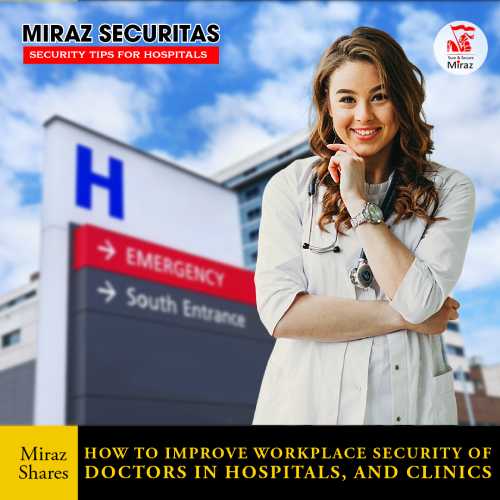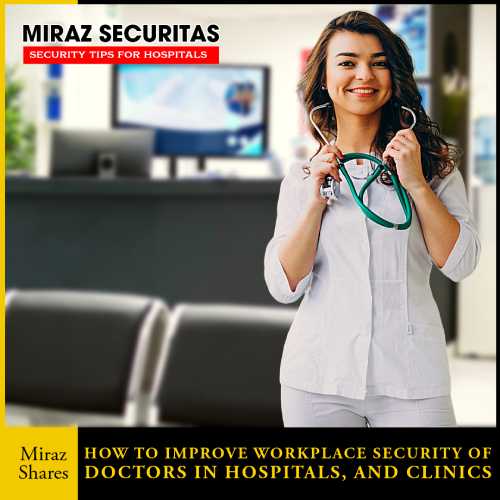The healthcare industry in India is thriving, which means more jobs and better access to care, especially in rural areas. But with growth comes risks, and recent incidents show that violence against healthcare workers is a big concern. Recent surveys paint a grim picture, with 80% of doctors in India reporting encounters with various forms of violence during their practice.
From verbal abuse to physical harm, the spectrum of threats is wide and alarming. But this problem isn’t unique to India. Violence against healthcare workers is a global problem, affecting both developed and developing countries. It’s like a pandemic of its own, posing serious challenges.
Miraz Securitas, the leading security service provider for hospitals and clinics in India, shares tips and tricks of improving the workplace security of medical practitioners in the healthcare industry.
What are the ways to improve workplace security for doctors in hospitals and clinics?
According to Mr. Atul Mahajan, Director of Miraz Securitas, some of the things to ensure workplace security for doctors are:
Proper Access Control Methods
Access control is vital for staff safety in hospitals and clinics, particularly in areas like emergency departments. Methods such as manned security, barriers, and CCTV help manage access. Staff can safely enter using electronic keycards.
Restricting entry to authorized personnel is crucial, employing keycards, biometrics, or access codes. Integrated systems are essential. Upgraded access systems with electronic locks and individual cards enhance security. Verifying visitor IDs and using biometrics in drug areas further ensure safety.
Incident Reporting is a Must
It is important to report incidents and keep records in hospitals and clinics to make sure everyone stays safe, especially doctors and medical staff. When incidents like violence or abuse aren’t reported, it’s hard to know what dangers are in the workplace. Sometimes, nurses might tell others about what happened instead of using the official reporting system. But this can make it tough for bosses to understand all the safety problems.
Every hospital is different, so it’s crucial to listen to the workers to create the right rules. But many are scared to speak up because they fear getting in trouble. This leads to only some incidents being reported, leaving out important information.
To fix this, hospitals can make it easier for staff to report by having simple systems in place. This way, everyone can feel safe and bosses can fix any problems quickly.
Video Surveillance Keeps Hospital Staff Safe and Secure
Surveillance cameras in hospitals are more than just video capture devices; they’re smart sensors that watch for specific things in real-time. They help nurses monitor patients and alert medical staff to any issues. Security can use live video to quickly respond to dangerous situations.
Remote monitoring allows off-site personnel to watch multiple feeds simultaneously, while clever software detects trouble and directs assistance where needed, ensuring hospital safety and efficiency.
Implementation of Safe Patient Handling Techniques
Sometimes, doctors and medical practitioners face injuries in healthcare facilities due to patient-handling tasks like lifting and bending. These activities can strain their bodies, especially for older workers. Additionally, patient-handling incidents can lead to patient injuries such as falls and pressure ulcers. To prevent these issues, hospitals need safe patient-handling programs.
These programs involve investing in patient lifting equipment and implementing ergonomic handling procedures. Moreover, training sessions and hiring trained lift teams can further enhance safety. By prioritizing safe patient handling, hospitals can minimize injuries to staff and patients, reduce downtime, and lower worker compensation claims.
Hire Well-Trained Security Guards
Ideally, hospitals and clinics should employ security guards at key points to ensure safety. Having full-time security officers provides support to healthcare workers and ensures they feel secure. Guards stationed in the emergency department and other public areas enhance safety for both staff and patients.
Placing security officers on each floor or wing improves response times in emergencies. Efficient and well-trained guards make it easier for people to get help quickly, enhancing workplace safety for doctors and staff alike.
Cybersecurity Measures
Implementing cybersecurity measures is crucial for protecting doctors and ensuring workplace safety in hospitals and clinics. Even small facilities face risks like ransomware attacks and data breaches. Hackers exploit unguarded computers to steal patient information easily.
Stricter privacy laws mandate regulating digital health data. Storing files securely, locking computers, and training staff are vital. Hospitals must invest in robust cybersecurity to safeguard research and intellectual property, improving overall security for doctors and staff.
Therefore, in a nutshell, prioritizing proper access control, incident reporting, video surveillance, safe patient handling, hiring trained security guards, and implementing cybersecurity measures ensures a safer workplace for medical practitioners in healthcare facilities.
- Home Security Tips If You Are a Single Mom - July 26, 2024
- What Can Security Do To Protect A Mine Site? - July 17, 2024
- What a Security Guard can do for an Oil and Gas Plant Unit? - July 12, 2024

